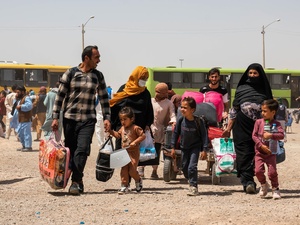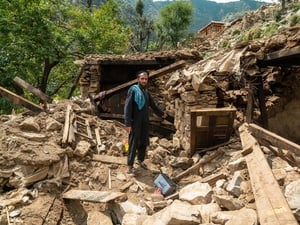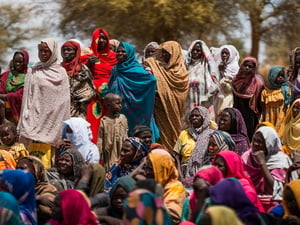Pace of Afghan returns picks up again as spring approaches
Pace of Afghan returns picks up again as spring approaches

Afghan refugees returning from Pakistan, part of the 1.8 million assisted back to Afghanistan by UNHCR in 2002.
KABUL, Afghanistan, March 11 (UNHCR) - In a sign that the spring repatriation season has started in earnest, thousands of Afghan refugees are returning home from neighbouring countries this week as the UN refugee agency unveils new high-tech screening equipment.
On Tuesday, some 1,000 Afghans registered at the Katcha Garhi refugee camp on the edge of Peshawar, Pakistan, ahead of their repatriation this week. Over the last two days, 1,117 refugees returned from Iran, including 460 under a joint initiative by UNHCR and the Iranian government. These numbers mark a significant increase from the winter months.
To prepare for this year's returns to Afghanistan, UNHCR repatriation staff in Pakistan went through a month of refresher training in February. Three registration centres are being set up in Pakistan while a fourth will be established at a crossing point just inside Afghanistan.
Iris-recognition equipment is also in place to complement UNHCR's continuing screening efforts. All refugees over the age of 12 will undergo testing to identify anyone who has previously sought repatriation assistance. The widespread use of the iris-scan technology, tested last year, will supplement other ongoing verification efforts by the refugee agency to thwart repeated claims for repatriation assistance.
Afghan refugees going home under the facilitated return initiative receive a small travel grant of between $3 and $30 depending on the distance to their home communities, along with some food and other assistance provided inside Afghanistan.
This year, UNHCR plans to assist the repatriation of up to 1.2 million Afghan refugees from Pakistan, Iran and the Central Asian states, and to help another 300,000 internally displaced Afghans to go back to their home areas. The agency will focus on refugees in Pakistan's more than 200 refugee camps, while continuing to facilitate the return of Afghans in Pakistan's urban areas.
Some Afghan refugees may be considering return as recent rains across Afghanistan have eased the effects of a long drought in the north and alleviated some water problems in the south and east of the country. Others, however, are still concerned about a lack of security, shelter and employment in their homeland.
Returns this year are expected to be more gradual than last year, when over 2 million people went back to Afghanistan. UNHCR is shifting its focus from maximising the number of Afghan returnees to ensuring that the repatriation is sustainable, and is working closely with development agencies to encourage long-term assistance inside Afghanistan.
The refugee agency has appealed for $195 million to fund its Afghanistan programme and to assist Afghan refugees in surrounding countries. So far, it has received only $47 million, including $16 million in carry-over funds from 2002.









